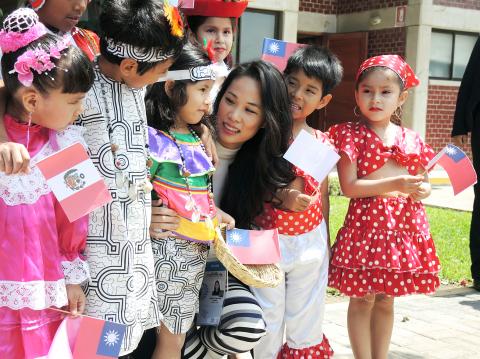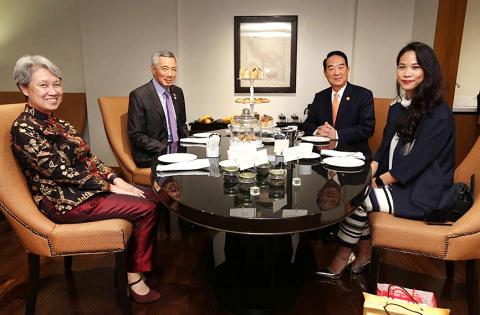People First Party (PFP) Chairman James Soong (宋楚瑜), the nation’s representative to the APEC leaders’ summit in Peru, met with Singaporean Prime Minister Lee Hsien Loong (李顯龍) on Friday, and was expected to later meet other ASEAN leaders.
The two held private talks on Friday afternoon in the capital, Lima, in the company of Soong’s daughter and Lee’s wife.
Lee was the second APEC representative Soong spoke with since he arrived on Wednesday after he met US Secretary of State John Kerry on Thursday to discuss APEC issues.

Photo: Lin Liang-sheng, Taipei Times
Following the meeting with Kerry, the pair issued a joint statement announcing plans to set up an “APEC women and the economy sub-fund.”
The fund is to support the key pillars of the APEC Policy Partnership on Women and the Economy — access to capital and markets; skills and capacity building; women’s leadership; and innovation and technology.
A source said that Soong was initially under pressure to keep the meeting with Lee secret, but it became public when Lee on Friday night posted photographs on Facebook of the four sitting around a table for tea.

Screengrab from Lee Hsien Loong’s Facebook account
The atmosphere of the one-hour meeting was relaxed and cordial, with Soong’s relationship with Lee and Lee’s father, the late Singaporean prime minister Lee Kuan Yew (李光耀), among the topics they discussed, said the source, who spoke on condition of anonymity.
Both sides were under great pressure to keep details of the meeting private, the source said, adding that speculation pointed to China as the source of the “pressure.”
A member of the Taiwanese delegation, who also requested anonymity, declined to confirm the speculation, but said: “If one does not provoke an antagonist, one will not find themselves obstructed.”
Soong would keep details of a meeting private if his counterpart requested privacy, the delegation member said.
The first source said that Soong is also expected to meet with the representatives of other ASEAN members.
“As per summit convention there will be private meetings arranged between leaders outside of the summit hall,” the source said, adding that no private meetings had been arranged with Chinese President Xi Jinping (習近平).
As for a potential meeting between Soong and Japanese Prime Minister Shinzo Abe, who arrived in Lima on Friday, the source said talks between the two would not touch upon the issue of food safety, “just as Soong’s talks with Kerry did not bring up the issue of US pork.”
Meanwhile, Soong’s daughter, Soong Cheng-mai (宋鎮邁), and National Security Council Deputy Secretary-General Tseng Hou-jen (曾厚仁) visited the SOS International Children’s Village in rural Callao, just outside of Lima.
Soong Cheng-mai spoke with children in Spanish and delivered schoolbags and stationery.
Asked about the chance to meet Xi’s wife, Peng Liyuan (彭麗媛), and US first lady Michelle Obama, Soong Cheng-mai said she would take things as they come.
PFP Legislator Lee Hung-chun (李鴻鈞), one of the delegates, said that given the similarity in age and demeanor of Soong Cheng-mai, Michelle and Peng, the group should get along quite well.
Soong Cheng-mai will present the others with gifts of pineapple cakes and tea from Taiwan, Lee Hung-chun said.
Additional reporting by CNA

CARROT AND STICK: While unrelenting in its military threats, China attracted nearly 40,000 Taiwanese to over 400 business events last year Nearly 40,000 Taiwanese last year joined industry events in China, such as conferences and trade fairs, supported by the Chinese government, a study showed yesterday, as Beijing ramps up a charm offensive toward Taipei alongside military pressure. China has long taken a carrot-and-stick approach to Taiwan, threatening it with the prospect of military action while reaching out to those it believes are amenable to Beijing’s point of view. Taiwanese security officials are wary of what they see as Beijing’s influence campaigns to sway public opinion after Taipei and Beijing gradually resumed travel links halted by the COVID-19 pandemic, but the scale of

TRADE: A mandatory declaration of origin for manufactured goods bound for the US is to take effect on May 7 to block China from exploiting Taiwan’s trade channels All products manufactured in Taiwan and exported to the US must include a signed declaration of origin starting on May 7, the Bureau of Foreign Trade announced yesterday. US President Donald Trump on April 2 imposed a 32 percent tariff on imports from Taiwan, but one week later announced a 90-day pause on its implementation. However, a universal 10 percent tariff was immediately applied to most imports from around the world. On April 12, the Trump administration further exempted computers, smartphones and semiconductors from the new tariffs. In response, President William Lai’s (賴清德) administration has introduced a series of countermeasures to support affected

Pope Francis is be laid to rest on Saturday after lying in state for three days in St Peter’s Basilica, where the faithful are expected to flock to pay their respects to history’s first Latin American pontiff. The cardinals met yesterday in the Vatican’s synod hall to chart the next steps before a conclave begins to choose Francis’ successor, as condolences poured in from around the world. According to current norms, the conclave must begin between May 5 and 10. The cardinals set the funeral for Saturday at 10am in St Peter’s Square, to be celebrated by the dean of the College

CROSS-STRAIT: The vast majority of Taiwanese support maintaining the ‘status quo,’ while concern is rising about Beijing’s influence operations More than eight out of 10 Taiwanese reject Beijing’s “one country, two systems” framework for cross-strait relations, according to a survey released by the Mainland Affairs Council (MAC) on Thursday. The MAC’s latest quarterly survey found that 84.4 percent of respondents opposed Beijing’s “one country, two systems” formula for handling cross-strait relations — a figure consistent with past polling. Over the past three years, opposition to the framework has remained high, ranging from a low of 83.6 percent in April 2023 to a peak of 89.6 percent in April last year. In the most recent poll, 82.5 percent also rejected China’s